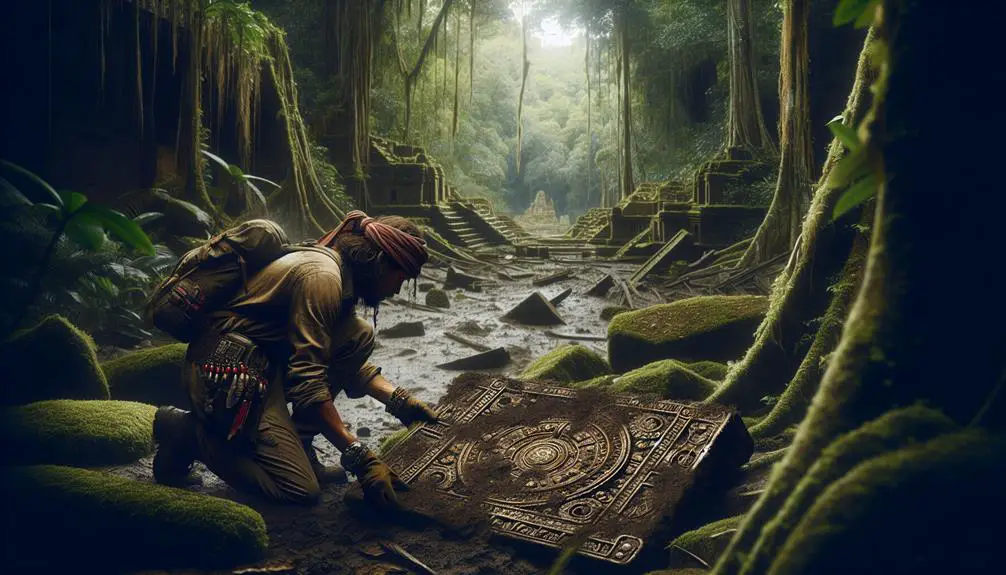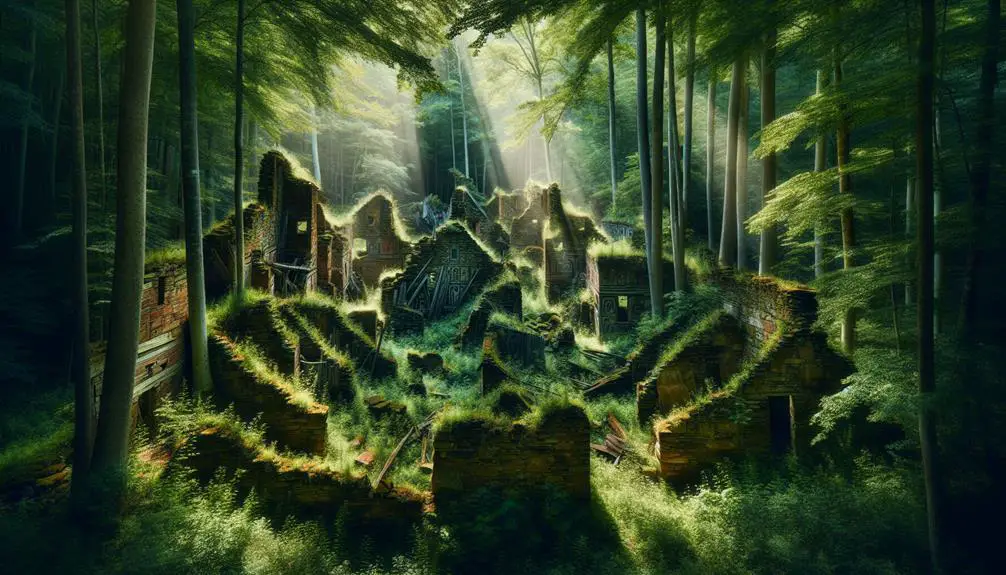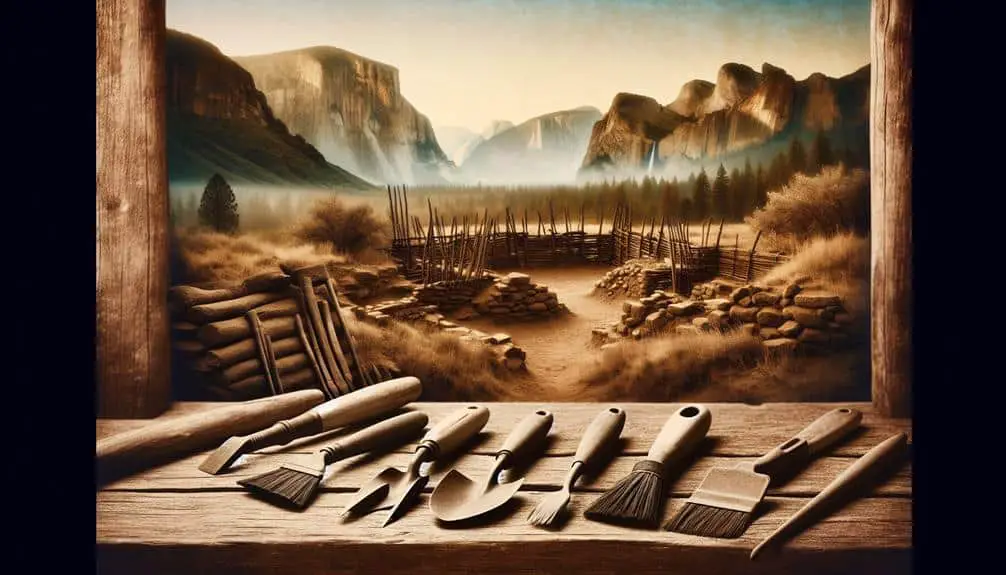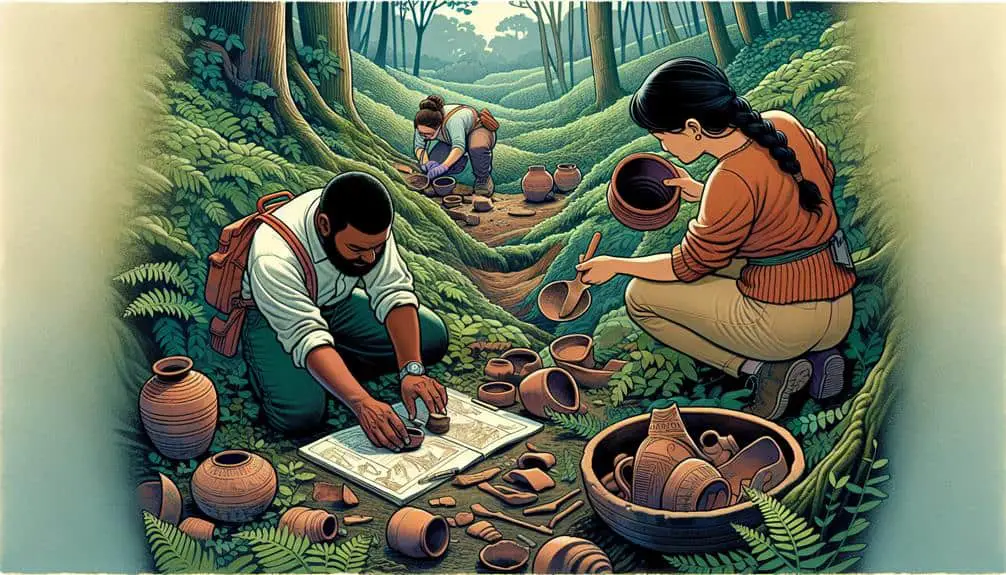Begin the exploration of Native American lost civilizations by delving into local tribes and histories. Investigate archaeological sites meticulously for insights into their lives. Consult with tribal elders to comprehend their rich history. Immerse yourself in traditions by visiting museums and participating in festivals. Analyze historical maps and records for clues about lost civilizations. Volunteer for preservation projects to safeguard cultural heritage. Interact with artisans and sample traditional foods for deeper insight. Honor sacred sites and artifacts, and recognize the historical and cultural significance. By following these suggestions, you'll initiate a captivating journey of discovery into Native American lost civilizations.
Key Points
- Consult with tribal elders for insights on lost civilizations.
- Visit museums and cultural centers for historical context.
- Volunteer for preservation projects to safeguard heritage.
- Engage with descendant communities for shared knowledge.
- Join archaeological expeditions to contribute to research.
Research Local Tribes and Histories
To uncover the mysteries of lost Native American civilizations, begin by delving into the rich histories of local tribes with meticulous research. Understanding tribal customs and indigenous histories is essential in piecing together the puzzle of vanished civilizations. Start by immersing yourself in the traditions and practices of the tribes that once inhabited the regions you're exploring. Explore the intricate social structures, religious beliefs, and daily life of these communities to gain insight into their way of living.
Conduct thorough research by examining historical documents, oral traditions, and archaeological findings related to the local tribes. Look into primary sources that shed light on the interactions between different tribes and their relationships with the land. By analyzing these sources critically, you can uncover hidden clues that may lead you to the remnants of lost civilizations.
Explore Archaeological Sites
Exploring archaeological sites provides a window into the past, revealing layers of history waiting to be discovered. When delving into these sites, consider the following to enhance your exploration:
- Site Preservation: Be respectful of the archaeological sites you visit. These locations are fragile and can easily be damaged. Refrain from touching or moving artifacts, and always follow any posted guidelines to help preserve these valuable remnants of the past.
- Cultural Significance: Take the time to research the cultural significance of the archaeological sites you plan to visit. Understanding the historical context and importance of these sites can deepen your appreciation for the indigenous cultures that once thrived there.
- Archaeological Excavations: Keep an eye out for ongoing or past archaeological excavations at the sites you explore. These digs can provide valuable insights into the lives of Native American civilizations and the techniques used by archaeologists to uncover their secrets.
Consult With Tribal Elders
Engage in dialogue with tribal elders to gain invaluable insights into the rich history and traditions of Native American civilizations. Tribal elders hold a wealth of knowledge passed down through generations via oral traditions, ensuring the cultural preservation of their communities. By consulting with these elders, you can tap into a deep well of tribal knowledge and ancestral connections that provide a unique perspective on the lost civilizations of Native Americans.
Listening to the stories shared by tribal elders can offer a more nuanced understanding of the historical events, social structures, and spiritual beliefs that shaped these ancient cultures. Their firsthand accounts bring to life the experiences of past generations, shedding light on the customs and practices that have endured over time. Through these conversations, you can develop a deeper appreciation for the complexities of Native American societies and the significance of their contributions to global history.
In your quest to uncover lost civilizations, remember that tribal elders are invaluable sources of wisdom and insight, offering a bridge between the past and the present for those seeking to explore the mysteries of Native American heritage.
Visit Museums and Cultural Centers
When you visit museums and cultural centers, you have the opportunity to explore historical artifacts that offer insights into Native American lost civilizations. Attending cultural events hosted by these institutions allows you to immerse yourself in the traditions and practices of these ancient societies.
Engaging with local communities through these visits can provide a deeper understanding of the rich history and heritage of Native American cultures.
Explore Historical Artifacts
Numerous significant historical artifacts await discovery in museums and cultural centers that shed light on the lost civilizations of Native Americans. When you visit these institutions, take the time to analyze artifacts carefully. Preservation techniques used for these items are essential to maintaining their integrity for future generations.
Here are some key points to ponder:
- Artifact Origins: Explore the origins of each artifact to understand its cultural significance.
- Material Composition: Examine the materials used to create the artifacts, providing clues about the technological advancements of the civilization.
- Symbolism and Meaning: Interpret the symbols and meanings behind each artifact to uncover the beliefs and values of the Native American civilizations.
Attend Cultural Events
Discover the rich cultural heritage of Native American civilizations by attending cultural events at museums and cultural centers. Immerse yourself in the vibrant tapestry of Native American traditions through cultural celebrations, community gatherings, and interactive exhibits.
Museums and cultural centers often host events that showcase traditional ceremonies and spiritual practices, offering you a unique insight into the deep-rooted customs of indigenous communities. Witness engaging performances, participate in hands-on workshops, and engage with knowledgeable guides who can provide valuable historical context.
Engage With Local Communities
Engage with local communities by visiting museums and cultural centers to explore the rich history and traditions of Native American civilizations. Connecting with community leaders can provide valuable insights and a deeper understanding of the culture.
Participating in cultural ceremonies allows you to immerse yourself in the traditions and rituals that have been passed down through generations. When you visit these museums and centers, take the time to engage with the exhibits, artifacts, and interactive displays to gain a thorough perspective on the diverse Native American civilizations that once thrived across the land.
Study Historical Maps and Records
By examining historical maps and records, you can uncover essential clues about the lost civilizations of Native Americans. Analyzing ancient cartography offers insights into the landscapes and settlements that once thrived. Look for old maps that may indicate trading routes, sacred sites, or even forgotten cities. These maps could hold valuable information that helps piece together the puzzle of these lost civilizations.
Studying indigenous archives is another crucial avenue to explore. Explore tribal records, oral histories, and written accounts passed down through generations. These records may contain references to ancient settlements, customs, and events that shed light on the rich history of Native American civilizations.
Take the time to cross-reference different sources, comparing maps with historical accounts and indigenous stories. By triangulating information from various records, you can create a more inclusive picture of the lost civilizations that once thrived on this land. Through meticulous research and attention to detail, you can uncover hidden gems of knowledge waiting to be discovered in historical maps and records.
Join Archaeological Expeditions
Consider undertaking archaeological expeditions to explore further into the mysteries of Native American lost civilizations. By participating in these expeditions, you can actively engage in uncovering ancient artifacts and structures, gaining firsthand knowledge and insights into the history and culture of these civilizations. Here are three key reasons why joining archaeological expeditions can be a valuable experience:
- Hands-On Learning: Engaging in excavations and fieldwork allows you to learn about archaeological techniques, artifact identification, and preservation methods. This hands-on experience can deepen your understanding of Native American history and the significance of archaeological discoveries.
- Contribution to Research: Your participation in archaeological expeditions contributes to ongoing research efforts aimed at unraveling the mysteries of Native American lost civilizations. By actively participating in excavations, you're directly involved in expanding the knowledge base of these ancient cultures.
- Cultural Immersion: Joining archaeological expeditions provides a unique opportunity to immerse yourself in the culture and traditions of Native American communities. Through interactions with local experts and community members, you can gain valuable insights into the spiritual beliefs, customs, and practices of these civilizations.
Attend Native American Festivals
When attending Native American festivals, you have the opportunity to explore cultural performances that showcase traditional dances and rituals.
You can taste authentic Native American foods, providing insight into their culinary traditions and ingredients.
Engaging with skilled artisans at these festivals allows you to witness the creation of traditional crafts and art forms firsthand.
Explore Cultural Performances
One can gain profound insight into Native American cultures by attending vibrant and enriching festivals that showcase a diverse array of cultural performances. These events offer a window into the traditions and beliefs of various tribes, providing a firsthand experience of their rich heritage.
Here are three key elements to explore at Native American festivals:
- Traditional Dances: Witness mesmerizing traditional dances that hold deep cultural significance.
- Storytelling: Engage with storytellers who pass down ancient tales through oral traditions.
- Cultural Music and Art: Immerse yourself in the melodious sounds and intricate art forms that reflect the creativity and spirituality of Native American communities.
Taste Traditional Foods
Exploring Native American festivals provides a unique opportunity to savor traditional foods deeply rooted in cultural heritage.
Try traditional dishes like frybread, pemmican, or succotash to experience indigenous cuisine at its finest.
Many festivals offer cooking demonstrations where you can learn recipes passed down through generations, gaining insights into the ingredients and techniques that make these dishes so special.
Engaging with Native American cuisine not only tantalizes your taste buds but also fosters a deeper understanding of the cultural significance behind each dish.
Engage With Artisans
Immerse yourself in the vibrant world of Native American craftsmanship by attending festivals where artisans showcase their traditional skills and cultural heritage. Connecting with these skilled individuals provides a unique opportunity to explore the rich tapestry of Native American artistry.
By engaging with artisans, you can witness firsthand the intricate process behind their creations and gain a deeper understanding of the techniques passed down through generations.
Here are a few ways to make the most of your experience:
- Participate in interactive workshops to learn traditional techniques directly from the artisans.
- Support local artisans by purchasing authentic handmade crafts that hold cultural significance.
- Engage in conversations with artisans to gain insights into the stories and meanings woven into their creations.
Volunteer for Preservation Projects
To contribute to the preservation of Native American lost civilizations, consider volunteering for restoration and conservation projects in collaboration with local tribes and organizations. Preservation efforts are essential in safeguarding cultural heritage and archaeological sites. By volunteering, you actively participate in protecting these important remnants of history while gaining hands-on experience in conservation practices.
Engaging in preservation projects allows you to work closely with experts and community members, learning about traditional techniques and the significance of these sites. Through community involvement, you can contribute to the ongoing efforts to maintain and restore these invaluable cultural assets. Working side by side with local tribes provides a unique opportunity to understand the deep connection between these civilizations and the land they inhabited.
Volunteering for preservation projects not only helps in physically conserving these sites but also aids in raising awareness about their importance. Your involvement can make a real difference in the ongoing efforts to make sure that Native American lost civilizations are protected for future generations to appreciate and learn from.
Seek Out Oral Histories
You can uncover a treasure trove of historical insights by seeking out oral histories from Native American communities. These stories hold valuable wisdom that has been passed down through generations, offering unique perspectives on lost civilizations waiting to be discovered.
Treasure in Stories
Exploring oral histories can reveal hidden treasures of Native American lost civilizations, enriching our understanding of their culture and history. Uncovering folklore tales, hidden treasures, and mythical legends can provide valuable insights into the beliefs and traditions of these ancient civilizations.
Many oral traditions speak of mythical legends that hold clues to the locations of buried riches, sparking curiosity and excitement among researchers and historians. By delving into these stories passed down through generations, you may unearth valuable information about the daily lives, rituals, and customs of Native American societies that have long been forgotten or overlooked.
Embracing these narratives can offer a profound connection to the past and shed light on the complexities of these lost civilizations.
Wisdom Passed Down
Delving into the rich tapestry of oral histories from Native American cultures can expose profound wisdom and insights into the depths of their ancient civilizations. Exploring ancient traditions through these narratives allows you to connect with the ancestors who laid the foundations of these lost civilizations. Listening to the stories handed down through generations reveals a world of knowledge that offers a unique perspective on how these societies thrived and interacted with their environment.
Uncovering Hidden Narratives
Immersing yourself in the narratives passed down orally within Native American cultures reveals concealed layers of history and insights waiting to be discovered. Uncovering hidden narratives through oral histories is a key aspect of cultural preservation, offering a unique perspective on the past that may differ from written records.
Here are three essential tips for delving into these rich oral traditions:
- Engage with Elders: Seek out conversations with elders in Native American communities, as they hold valuable knowledge and stories that have been passed down through generations.
- Attend Cultural Events: Participate in traditional ceremonies, storytelling sessions, and cultural gatherings to immerse yourself in the living traditions of Native American peoples.
- Document and Share: Respectfully document the narratives you encounter and consider ways to share them with others to contribute to the preservation of these hidden histories.
Respect Sacred Sites and Artifacts
Respecting sacred sites and artifacts is paramount in the preservation and understanding of Native American lost civilizations. Ethical excavation and preservation practices are essential to protect these sites from irreversible damage. When exploring these areas, it's indispensable to approach them with cultural sensitivity and education in mind. Understanding the significance of these sites to Native American tribes helps in fostering a deeper respect for their history and traditions.
Cultural sensitivity involves recognizing the spiritual and cultural importance of these sites to the descendant communities. By approaching these areas with reverence and respect, we not only preserve physical artifacts but also honor the spiritual beliefs intertwined with them. Education plays a critical role in raising awareness about the importance of these sites and the need for their protection.
Frequently Asked Questions
How Can I Ensure That I Am Respecting the Cultural Sensitivities of the Local Tribes When Conducting Research or Visiting Archaeological Sites?
To guarantee you respect the cultural sensitivities of local tribes during research or site visits, prioritize understanding and honoring traditions. Prioritize cultural exchange over exploitation, seeking permission, engaging in meaningful dialogue, and supporting preservation efforts.
Are There Any Specific Protocols or Guidelines I Should Follow When Consulting With Tribal Elders?
When consulting with tribal elders, respect their perspectives and honor cultural sensitivity. Follow consultation etiquette by listening attentively, asking thoughtful questions, and acknowledging tribal traditions. Building trust is key to fostering meaningful relationships.
What Steps Can I Take to Properly Document and Preserve Any Artifacts or Information I May Come Across During My Exploration?
To properly document and preserve artifacts or information, take care to handle them with respect and sensitivity. Use appropriate storage methods and avoid altering or damaging any items. Cultural understanding is key.
How Can I Best Engage With the Local Community and Contribute to Preservation Projects in a Meaningful Way?
To best engage with the local community and contribute to preservation projects in a meaningful way, you should prioritize building relationships, listening to their needs, respecting traditions, showing cultural sensitivity, and actively participating in collaborative efforts.
Are There Any Potential Risks or Challenges I Should Be Aware of When Joining Archaeological Expeditions in Search of Native American Lost Civilizations?
Exploration risks can include harsh terrain and wildlife encounters. Understanding cultural etiquette is essential to respect sacred sites. Preservation techniques vary, so seek guidance. Engage with the community to learn and contribute meaningfully to archaeological expeditions.



